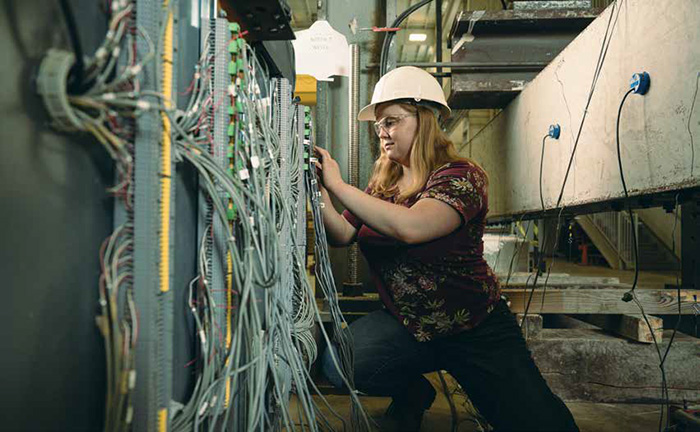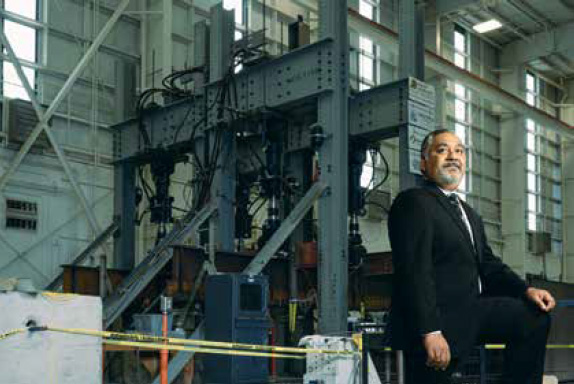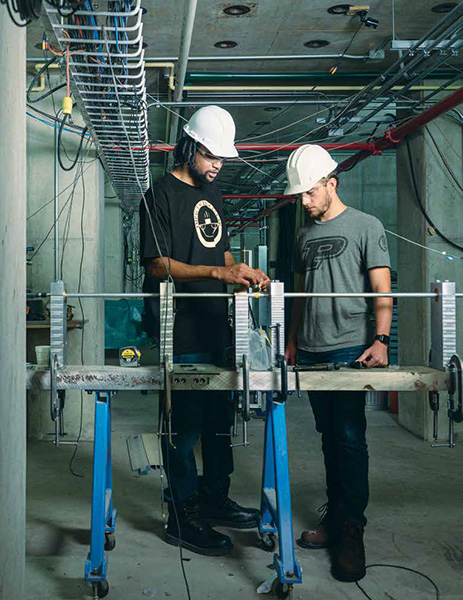20 Years of Excellence at Scale

Bowen Lab marks two decades of innovation in large-scale civil engineering research
First-time visitors to the Robert L. and Terry L. Bowen Laboratory for Large-Scale Civil Engineering Research know they’re entering a large facility, but before stepping foot inside, it’s difficult to comprehend just how big Bowen Lab truly is. Amit Varma, the Karl H. Kettelhut Professor of Civil Engineering and director of Bowen Lab, enjoys that element of surprise.
After donning the appropriate personal protective gear — safety is a very important aspect of the lab’s culture — Varma tells his guests to brace themselves. “When I open the door and show them the laboratory, there’s an audible gasp once they see how big it is,” he said.
Dedicated in October 2003, then-university President Martin Jischke hailed Bowen Lab as “the world’s most modern, well-equipped lab for large-scale testing.” It’s a status Varma and other leaders in the Lyles School of Civil Engineering have worked hard to maintain.
Bob Bowen (BSCE’62) and his wife, Terry, provided a $2.25 million gift to the Purdue Research Foundation toward the $11 million lab, which was built with private funding from about 50 donors. Bowen Lab marked its 20th anniversary in 2023.

Amit Varma is the Karl H. Kettelhut Professor of Civil Engineering and director of Bowen Lab.
Improving the nation's infrastructure
When Bowen Lab opened, it gave researchers six times more space than what had previously been available in the university’s old structural testing lab, built in 1952. Mark Bowman (BSCE’74, MSCE’75), professor emeritus of civil engineering and director of the Bowen Lab from 2010 to 2017, first worked in the old lab space as student, helping Jim Meyers (MSCE’60, PhD CE’63), professor emeritus, with his research on hyperbolic shells.
“The structural testing lab was small, only about 60 feet by 60 feet,” said Bowman, who later became director of the lab. “It had its own version of a strong floor where we could test structural specimens, but there were columns right through the middle of the space. It wasn’t open, it was very constrained. It was valuable space at the time, but it limited the types of projects we could work on.”
Following the 6.7 magnitude Northridge earthquake near Los Angeles in 1994, Bowman received a call inquiring whether Purdue could conduct steel structural testing on beam-to-column joints. Bowman had to pass on the project because the university’s facilities couldn’t accommodte projects of that scale. Now, Varma routinely fields inquiries about Bowen’s extraordinary capabilities.
“Over the past 20 years, Bowen Lab has significantly contributed to the improvement of the nation’s infrastructure,” Varma said. “From influencing the design of high rise buildings to the construction of nuclear power plants, bridges and other structures related to national defense and security, Bowen Lab continues to serve as the premier facility for large-scale testing of civil engineering, structural components, connections and systems. Not to mention the 1,000-plus people — faculty, graduate students, undergraduate students, post-docs, visiting scholars, research engineers and technicians — whose careers have been enriched by conducting research in one of the world’s largest, most well-equipped and prestigious laboratories.”
The 66,000 square-foot facility with its 11,000 square foot strong floor continues to earn recognition. Projects supported by Bowen Lab research have been recipients of the Outstanding Projects and Leaders (OPAL) Award from the American Society of Civil Engineers. In 2020, the American Concrete Institute awarded Bowen Lab with the Charles S. Whitney Medal for engineering development. In 2023, the Bechtel Corp. presented Bowen Lab with its Innovation of the Year award for contributions to a large-scale government project.
“Our partnership with Purdue helped us develop a new approach to a construction challenge on a project with U.S. national security implications,” said Keith Churchill (BSCE’06), chief innovation officer at Bechtel. “Partnerships with research institutions like this are valuable to the industry, bringing new ideas and scientific rigor to innovations that improve our processes.”

Inspiring innovative solutions
As soon as it opened, Bowen Lab quickly became a draw to recruit faculty researchers to the university. When Bowman took over as lab director, he continued to build up and organize the equipment to ensure Bowen could meet the needs of varied research projects.
“My goal was to make sure faculty had the equipment and space to do what they wanted,” Bowman said. “I also implemented some policies to bring more organization to govern the lab. It doesn’t sound very sexy, but that transformation allowed the lab to flourish. Since the construction of the Bowen Lab, we have been able to recruit some exceptional faculty, many of whom are leaders in the Lyles School of Civil Engineering today.”
Over the past several years, Varma has tripled the number of laboratory technicians, invested in new equipment — including data acquisition systems and structure loading equipment — and increased the number of undergraduate students working in the lab by more than 50%.
“We’re intentionally engaging more with our undergraduate student researchers,” Varma said. “Working in Bowen Lab is a transformative experience. They get a chance to see experiments up close and personal. The principles they’ve learned from textbooks come alive. Interacting with the physical world broadens a student’s understanding of civil engineering.”
As Varma looks forward to Bowen’s next 20 years, he envisions more projects related to national defense and security. Which means one of the lab’s biggest assets also becomes a strategic challenge. Bowen is so big a football field could fit inside of its massive open space. That makes it difficult to conduct controlled or classified experiments that require some degree of secrecy.
“Whatever defines you also constrains you,” Varma said. “We may explore opportunities to reconfigure or expand to create restricted access portions of the laboratory. In addition to more proprietary work, we would very much like to conduct bigger missile impact-related tests and we certainly will be able to contribute to the sustainability question facing the country in terms of new materials. Whether it’s revitalizing deteriorating infrastructure or contributing to national defense, we want to be the cradle of innovative solutions that emerge in civil engineering over the next 20 years.”
